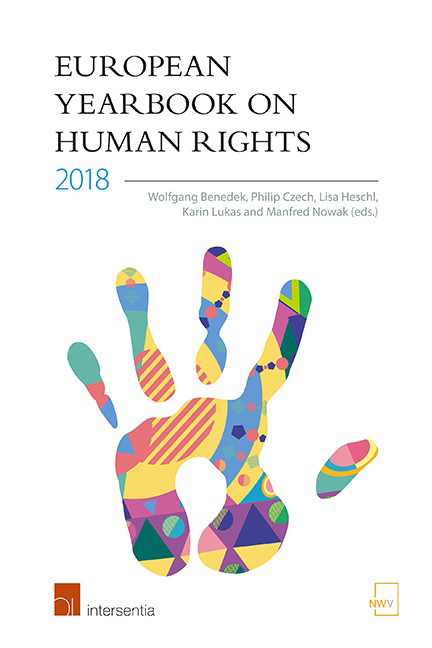Book contents
- Frontmatter
- Scientific Advisory Board
- Editors’ Preface
- Contents
- List of Abbreviations
- List of Contributors
- Part I Topic Of The Year
- Part II Eu
- Part III Coe
- The Jurisprudence of the European Court of Human Rights in 2017
- A Decade of Violations of the European Convention on Human Rights: Exploring Patterns of Repetitive Violations
- The Boundaries to Dialogue with the European Court of Human Rights
- Unprincipled Disobedience to International Decisions: A Primer from the Russian Constitutional Court
- The Impact of ECtHR and CJEU Judgments on the Rights of Asylum Seekers in the European Union: Adversaries or Allies in Asylum?
- The Human Right to Leave Any Country: A Right to be Delivered
- Some Reflections on the Principle of the Best Interests of the Child in European Expulsion Case Law
- Salafism in Europe: A Legal and Political Analysis of Human Rights and Security
- Delays in the Implementation of ECtHR Judgments: The Example of Cases Concerning Electoral Issues
- PART IV OSCE
- Part V Others
- Part VI Book Reviews
- Index
The Impact of ECtHR and CJEU Judgments on the Rights of Asylum Seekers in the European Union: Adversaries or Allies in Asylum?
from Part III - Coe
Published online by Cambridge University Press: 31 January 2019
- Frontmatter
- Scientific Advisory Board
- Editors’ Preface
- Contents
- List of Abbreviations
- List of Contributors
- Part I Topic Of The Year
- Part II Eu
- Part III Coe
- The Jurisprudence of the European Court of Human Rights in 2017
- A Decade of Violations of the European Convention on Human Rights: Exploring Patterns of Repetitive Violations
- The Boundaries to Dialogue with the European Court of Human Rights
- Unprincipled Disobedience to International Decisions: A Primer from the Russian Constitutional Court
- The Impact of ECtHR and CJEU Judgments on the Rights of Asylum Seekers in the European Union: Adversaries or Allies in Asylum?
- The Human Right to Leave Any Country: A Right to be Delivered
- Some Reflections on the Principle of the Best Interests of the Child in European Expulsion Case Law
- Salafism in Europe: A Legal and Political Analysis of Human Rights and Security
- Delays in the Implementation of ECtHR Judgments: The Example of Cases Concerning Electoral Issues
- PART IV OSCE
- Part V Others
- Part VI Book Reviews
- Index
Summary
ABSTRACT
Article 52(3) of the Charter of Fundamental Rights of the European Union (CFR) holds that the Court of Justice of the European Union (CJEU) is bound by the interpretation of case law by the European Court of Human Rights (ECtHR) for corresponding rights in the ECtHR. As such, the ECtHR – for corresponding rights – functions as the absolute minimum level of protection that is to be afforded by the CJEU. This provision ensures the necessary consistency and coherence between the ECtHR and the CJEU in matters that concern identical rights. However, in the assessment of case law in the field of asylum and migration – a highly politicised and topical area of law – it appears that this consistency and coherence is at times lost. Seemingly, the CJEU sometimes follows the line of reasoning by the ECtHR for corresponding asylum and migration related rights, sometimes explicitly rules against the line of reasoning by the ECtHR and sometimes simply does not pronounce itself on the standard of protection to be applied to corresponding rights. Bearing this in mind, legitimate expectations, legal certainty and the effectiveness of fundamental rights protection may be detrimentally affected vis-a-vis the rightholders, not to mention the institutional legitimacy of both Courts.
INTRODUCTION
Past decades have been indicative of the tumultuous relationship shared between CJEU and the European Court of Human Rights (ECtHR). Whereas in certain fields of fundamental rights protection, both Courts appear to apply a similar – if not equivalent – standard of protection, this cooperative approach is seemingly absent in the field of asylum and migration. Rather, it appears that both Courts, in protecting the fundamental rights of migrants and asylum seekers, apply an ad hoc approach in their reasoning, as a result of which their judgments often explicitly contradict each other, at other times converge, or alternatively are inconclusive as to the standard of protection to be afforded.
- Type
- Chapter
- Information
- European Yearbook on Human Rights 2018 , pp. 343 - 372Publisher: IntersentiaPrint publication year: 2018



